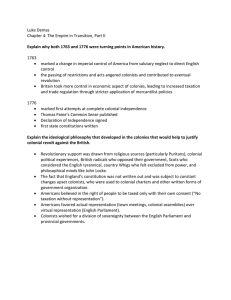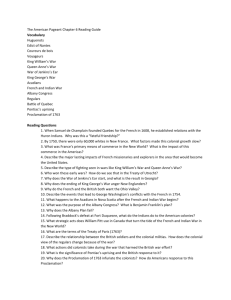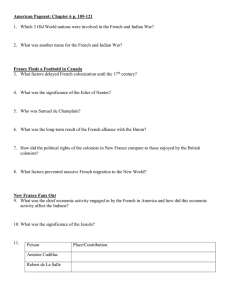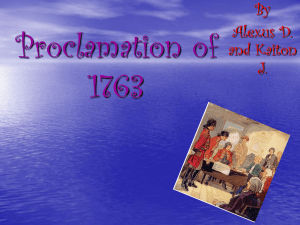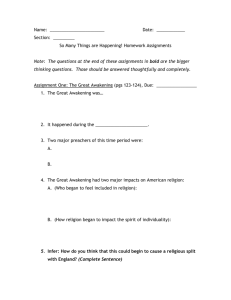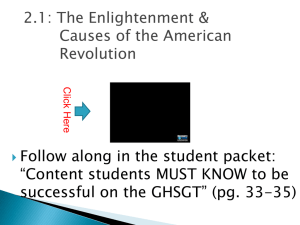Actions & Reactions - White Plains Public Schools
advertisement
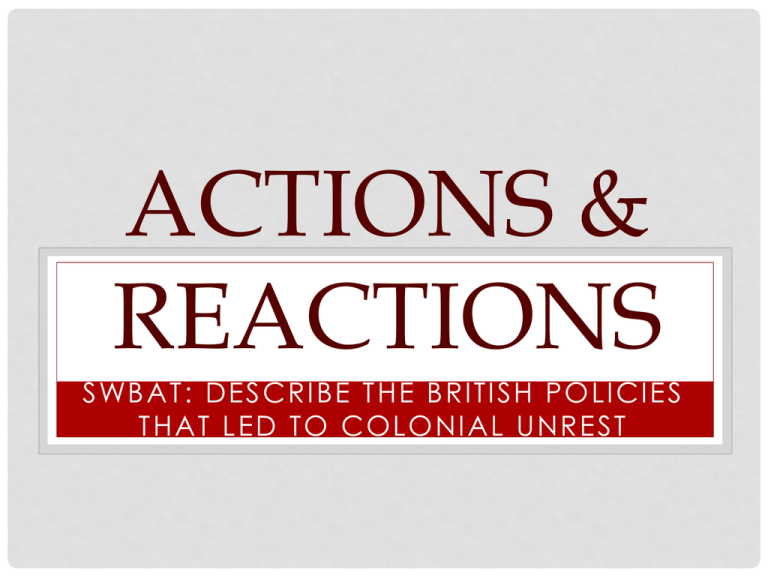
ACTIONS & REACTIONS SWBAT: DESCRI BE THE BRITISH POLI CI ES THAT LED TO COLONIAL UNREST DO NOW •With your group, explain one short-term and one long-term effect of the French and Indian War *THINK: Political, Cultural, Economic PROCLAMATION OF 1763 • After Pontiac’s War, King George III: - Prohibited colonial settlement west of the Appalachian Mountains - Land reserved for Indians - Only colonial governments could sell Indian land to private individuals PROCLAMATION OF 1763 • Goal: to stabilize colonial frontier to avoid being dragged into endless boarder conflicts • Who would be most upset by the proclamation? Why? PROCLAMATION OF 1763 Effects: • Settlers and speculators were enraged, infuriated they ignored the policy • George Washington himself sent agents to secretly purchase as much land as possible • Relationship between Indians & settlers worsened PROCLAMATION OF 1763 • First in a series of acts by the British government that angered colonists • In your group, determine the POV of the British v. POV of the colonists at this point in time… WHAT COMES NEXT… • You will use the textbook, additional info packets, and your smartphone to determine information to complete your assigned “Action-Reaction” events. • Complete the graphic organizer by explaining how each event caused a reaction… and how each reaction caused another action… and so forth. • Each group member is responsible for finding their assigned action-reaction. • You will then share-out your findings with your group members. WRAP UP • Complete “Historical Thinking Skill: Causation- The War for Independence” • Which “act” do you think was most influential in the start of the American Revolution/War for Independence? Why? FOUNDATIONS FOR REVOLUTION S WB A T: E X P L A IN TH E D IF F E R E N C E S B E TWE E N P A TR IO TS A N D L O Y A L IS TS DO NOW • What united colonists against the British? - British taxes WITHOUT colonial representation or consent; “virtual representation” COLONIAL JUSTIFICATION • Rights of British subjects • Rights of the individual • Tradition of self-rule in the colonies • Enlightenment ideas - John Locke “…the supreme power cannot take from any man any part of his property without his own consent…“ - Locke, Second Treatise of Civil Government, 1689 SONS OF LIBERTY • Formed:1765, response to Stamp Act • Boston, MASS • “No taxation without representation” • Tar and Feathered The Bostonian Paying the Excise-Man, 1774 PATRIOTS VS LOYALISTS PATRIOTS LOYALISTS • Lawyers, Merchants, Farmers: Paul Revere, John Hancock, John Adams, Thomas Paine, Ben Franklin, Alexander Hamilton, Thomas Jefferson • 40-50% of population • Against British control • Royal officials, clergymen, wealthy merchants • 20-30% of population • Rejected revolution • Favored remaining a part of British empire • AKA “Tories” PATRIOTS VS LOYALISTS PATRIOTS LOYALISTS • Men AND women gave financial & material support • Familiarity with the land • Military leadership of George Washington • Deep commitment • Foreign aid – most notably the French • Bigger military, more $ • Promised to limit colonial settlement in the West support from American Indians WRAP UP • SA Practice! • After 1763, Britain began to consolidate its control of the British colonies. A)Briefly explain a reason for this consolidation B)Briefly explain one British action taken between 1763 and 1776 C)Briefly explain one reaction by the colonists to the action described in part b)

